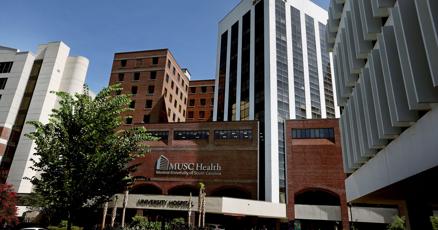The Medical University of South Carolina is one of four institutions nationwide chosen to join a global consortium exploring the genetics of what causes Parkinson’s disease, particularly for Black people, who are more likely to be underdiagnosed and undertreated.
MUSC will become part of the Black and African American Connections to Parkinson’s Disease study as part of the Global Parkinson’s Genetics Program.
“This collaborative research contributes to a more holistic, global understanding of (the disease), which is absolutely essential to discoveries that change lives,” said Dr. Lori McMahon, vice president for research at MUSC.

Tracy Pollan (left) and Michael J. Fox attend the Michael J. Fox Foundation benefit gala “A Funny Thing Happened on the Way to Cure Parkinson’s” at Casa Cipriani on Nov. 11, 2023, in New York. File/Evan Agostini/Invision/AP
The university’s Parkinson’s Foundation Center of Excellence will also use a $90,000 grant from The Michael J. Fox Foundation for Parkinson’s Research to enhance its outreach to other areas of the state to not only increase participation in the research but enhance access to services, particularly for Black patients and those in rural areas, said Dr. Vanessa Hinson, the center’s director.
“We cannot just sit in Charleston and wait for people to come and see us here,” she said.
MUSC was one of four sites added in the U.S. to increase the number of minority patients participating in Parkinson’s research, which has historically only focused on White patients.
Of those studies done between 1985 and 2007 when a racial breakdown was provided, less than 8 percent of patients were not White, according to one review. Black patients with Parkinson’s are consistently underdiagnosed or have diagnoses delayed and are undertreated compared to others, the review found.
While the incidence of the disease appears to be lower in Blacks than Whites, Hinson predicted that once barriers to diagnosis are removed, “We’ll see that people who are Black or African American get Parkinson’s just as much as White people,” she said.
While it is under one umbrella diagnosis, the causes of Parkinson’s may in fact be more diverse than that genetically and could vary from patient to patient, which could help explain why some have milder, less progressive symptoms than others.

Dr. Vanessa Hinson, director of the Medical University of South Carolina Parkinson’s Foundation Center of Excellence. Provided
The worldwide genetic consortium MUSC is joining has already borne that out in a study published in November providing a big clue to that difference. It found that patients in Africa, primarily Nigeria, and African Americans were more likely to have a particular form of a gene known as GBA1 that was previously unknown in studies that mostly looked at Whites and those of European descent.
“This seems to be very specific to people of African descent,” Hinson said.
Depending on whether you have one or two copies of the gene, it increases the risk of developing Parkinson’s by 50 to 400 percent, she said.
The initiative that helped fund it was spearheaded by Google co-founder Sergey Brin, who has had relatives with Parkinson’s and carries a genetic trait that increases his risk of developing the disease, according to Bloomberg.
While more work on the gene is needed, it is thought to influence the “garbage disposal system” within cells that helps it clear toxic proteins, Hinson said. That mechanism appears to break down in Parkinson’s patients so the toxins “accumulate and ultimately destroy brain cells,” she said.
Having a specific genetic target opens the door to targeting or silencing the gene or its products and providing more specific treatment, which is currently lacking in Parkinson’s.
“We treat everybody pretty much with the same medication,” Hinson said. Targeting genetic markers or mutations might provide patients with a milder course or even “stop the Parkinson’s in its tracks,” she said.
Genetic targeting of therapy is already commonplace in cancer and “that’s where we want to be with Parkinson’s,” Hinson said.
In the meantime, the Center of Excellence is reaching out to MUSC’s network of regional hospitals — from Florence to Kershaw to Columbia to Orangeburg, to draw more of those patients into specialized care, which research shows will result in better outcomes and survival. That is particularly true for Black patients, who are only 5 percent of the clinic’s patients, while Blacks make up 26.3 percent of the state’s population.
“We need to change that,” Hinson said. “We cannot accept that.”
Get the source article here






